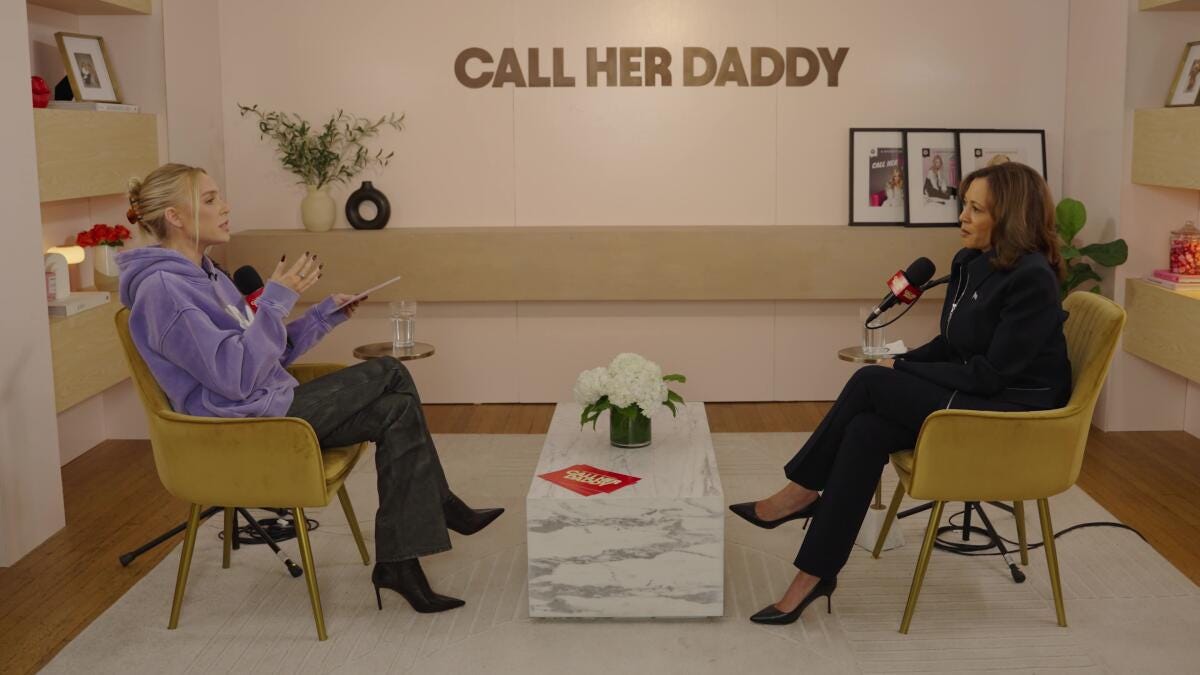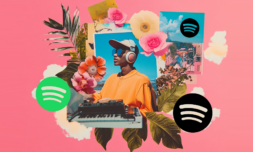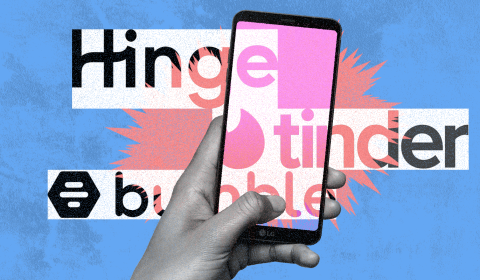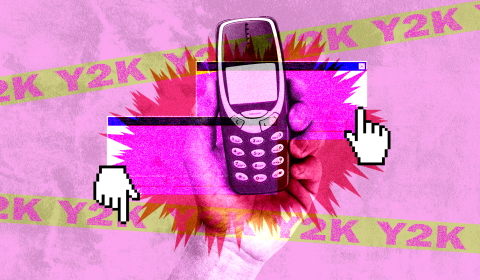behind the podcast craze.
![]()
Welcome to the latest edition of The Gen Zer. This week we dive into Gen Z’s love for a good podcast. We also cover health advice on TikTok, an unlikely Gen Z hero, and more . . .
If you haven’t been hiding under a rock for the past week, then you’ve probably seen that Vice President Kamala Harris went on Alex Cooper’s Call Her Daddy podcast. The two talked about a range of issues, from Harris’s upbringing to the rollback of abortion rights to the high cost of housing in the US. (If you haven’t heard of Call Her Daddy, its content is generally a mixture of relationship advice, gender issues and funny dating anecdotes. It’s also the second-most listened to podcast in the world.)
A presidential candidate going on a podcast is hardly surprising these days, though it’s incredible how quickly the medium has become a normalised part of day-to-day life. A decade ago podcasts seemed like little more than a place for internet niches and tiny communities.
For Gen Z, podcasts have quickly become a favourite way of discovering new topics and seeking out an hour or two’s entertainment. The fact that it’s an audio experience also helps, especially if you’re on the move, trying to multitask or simply want a break from screens. The rise of audio platforms and the ubiquity of social media has further accelerated the rise of the podcast phenomenon. Discovering podcasts is as easy as checking your Instagram. Finding, downloading and listening to that podcast is only going to take you a few more swipes on a different app.
As with the popularity of platforms like YouTube, the rise of podcasts has created not just a boom in new listeners, but an explosion in new creators, too. Starting a podcast is going to cost you little more than a mic and some time spent designing a logo. There’s a joke that “Dude, we should start a podcast” is the 2020s equivalent of the 2000s “Dude, we should start a band.” Now that I think about it, maybe we should start a podcast for The Gen Zer?
Just kidding. Mostly. Anyway, it’s no secret that podcast numbers have seen a tonne of growth over the past few years. In the UK, the number of different podcasts streamed per person has increased almost 10% since last year. The number of podcast listeners worldwide increased by a similar amount, with a total of 547 million people listening to them in 2024. And in the US, almost half of people aged 12 and over listen to a podcast at least once a month.

For Gen Z, the way that we’re approaching podcasts is changing, too. For starters, we’re becoming more international: listeners aged 13-25 are streaming more podcasts from outside their home country than any other age group. There’s a growing interest in a wider range of voices and perspectives. Anecdotally, a friend of mine uses podcasts to improve her French; they’re a great way to immerse yourself in both a different culture and a different language.
The podcast genres that are newly popular with Gen Z reflect a similar shift. According to a 2024 report by Spotify, Religion & Spirituality is the fastest growing genre for Gen Z adults, with a year on year growth of 65%. Other fast-growing genres include things like History, Meditation and Wellness.
I think there’s an aspect of escapism involved here. It’s a bit like the rise of fantasy and romantasy, with shows like Game of Thrones and book series like Sara J. Maas’ A Court of Thorns and Roses bringing the genres from the fringes to the mainstream over the past decade or so. In a world of 24-hour news cycles and an overall impression that we’re in permacrisis after permacrisis, things that take a step back and focus on the core aspects of humanity (like arts and culture, or conversation and storytelling) have been taking off. Which isn’t to say that current affairs and political podcasts aren’t doing well, but for Gen Z they’re far from the most popular genres. In fact, politics and current events is Gen Z’s least streamed genre, despite being the most streamed genre for Boomers.
Despite the exceptions to this (like the Kamala Harris episode of Call Her Daddy), Gen Z is getting less political and more artsy. Our streams in arts podcasts (which might cover anything from film to drawing to theatre) have increased by 31% year on year compared to 2023, a trend that is unique to Gen Z.
Alongside Art, our most streamed categories (in the UK) are Comedy, Health & Fitness, Society & Culture, and Sports. I think these genres are extremely telling when it comes to why Gen Z loves podcasts so much. For us, podcasts are not an extension of radio shows or social media. We don’t listen to them to keep up-to-date on current affairs or social change; our lives are already filled with an overwhelming amount of news, updates and depressing stories. Instead, we go to podcasts to seek connection. There’s an intimacy to podcasts that isn’t found in conversations on TV or social media. Similarly, many of the genres that are popping off (things like meditation or spirituality or even something like painting) help us to become more connected with ourselves.
For a while now, it’s seemed like the overall trend has been away from traditional long form media (things like newspapers, lengthy films, and books) and towards more short form content (like YouTube shorts, TikToks and Instagram Reels). Podcasts represent an exception to this trend, however, which is perhaps why they seem to offer something so unique. Amongst all the noise, they can be a refuge of normal humanity, a pleasant escape — perhaps the very one that Gen Z needs.
See also:
Gen Z around the Web
Why employers are firing Gen Z grads—and what needs to change (forbes)
I’ve written a fair amount on the jobs Gen Z want and how Gen Z are changing the workplace. The flip side of all this, of course, is where the generational differences don’t bring about positive change, but rather quickly lead to conflict and dismissal. In this article, Soulaima Gourani looks at a report that 60% of employers have already let go of some of the Gen Z employees they hired earlier this year and asks what’s going wrong. Read more
Gen Z are connected but un-social (archrival)
Gen Z is the most mobile, digitally-connected generation ever. Yet in conversation, Zs often sound unabashedly un-social: we block followers, archive our grids and retreat to secret accounts like Snapchat, “finstas” and secret TikToks. 72% of Gen Zs said personal privacy is an important issue, and 73% of Gen Zs would rather have a small group of friends than a big one. As is often the case, connection isn’t necessarily a cure for loneliness; Gen Z increasingly seem to have both. Read more
WHO joins TikTok to deliver science-based health info (thred)
Since the pandemic, there has been a surge in people seeking health information online. This has led to an increase in misinformation and has left many overwhelmed as they navigate online medical guidance. To help with this, the World Health Organization recently announced a collaboration with TikTok to deliver reliable science-based information on health and well-being to young adults. For all the downsides of social media, it can be a great tool in breaking down stigma and inspiring change. Dr Judith Jospeh, a leading psychiatrist and WHO content creator, spoke of how she has ‘encountered numerous stories in which patients recognized their own symptoms through social media and subsequently obtained the support that they needed. In many cases, social media has saved lives through storytelling.’ Read more
The hero Gen Z needs (the atlantic)
Helped along by a Snoopy fan account that went viral on TikTok a little while ago, Gen Z have been re-discovering the cartoon beagle and making him into an unlikely hero (an overwhelmed, adventurous one who likes nothing better than a large bowl of food). As a generation, we came of age amongst a barrage of climate and political catastrophes, so perhaps it’s little wonder that Snoopy has become a hero. Sometimes you just want an escape — one where you can feel your emotions as much as you want. Read more
![]()
That’s all for this week! Make sure to subscribe for the latest on Gen Z and youth culture, and check out The Common Thred for a weekly roundup of the latest news, trends and thought pieces.














 With the world hyper-focused on football transfer news, the Coldplay concert cheating scandal, and other genuinely grim world developments, I thought it might be nice to use this edition to focus on exciting news in technology, science, health, and wellness. In other words, the stories that’ll likely get buried in your timeline.
To provide...
With the world hyper-focused on football transfer news, the Coldplay concert cheating scandal, and other genuinely grim world developments, I thought it might be nice to use this edition to focus on exciting news in technology, science, health, and wellness. In other words, the stories that’ll likely get buried in your timeline.
To provide...


